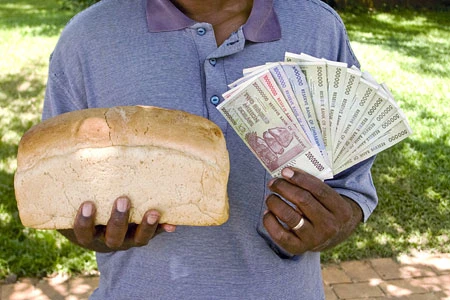Growing up (age 0-18) in a small S. American country, with uncles and cousins in 2 nearby nations, the situation in the U.S. of A has started setting off twinges of memory that were long dormant and likely best forgotten
, except for the fact that they are becoming ever more visible to the mind.
In the late 1950’s early 60’s, visits to family in Argentina & Brazil were a bit surreal, the main city was busy as ever with soot belching buses and lorries (trucks) going about their business, shops had all kinds of wares on display and people were everywhere as usual except for one strange thing, nothing had a price marked, all the goods had a letter code attached. This included foodstuffs such as ham, cheese and crackers, fish and meat as well as all other goods seen on display in windows or behind glass counters (sometimes refrigerated, often not).
You see, inflation of the currency was raging to the point where the local Peso (Cruzeiro in Brazil) lost value daily, hence the merchants had the official government issued bank tables, where inflation was indexed to the U.S. Dollar (stable at the time relative to all else) and the letter codes were used to convert the value of goods to local Pesos each day. The government actually planned and gave the impresion of controlling things by this method, and while it did not solve inflation, it sort of managed it.
For example, ham was say U.S. 3 dollars per kilogram per the letter code, and that day the local Peso was valued at 23.50/dollar, the merchant did the math and rang up your bill.
Tomorrow, that same ham would cost 24.50/dollar and so on, it was that bad, so much so that most bank accounts had zero savings (unless held in dollars or Swiss francs) and almost nothing remained in checking, everyone took their pay each Friday and immediately spent it, all of it, on whatever goods they could acquire (for consumption or barter). Many banks failed as did companies until there was a major shift away from the populist/socialists over to fiscal conservatives that were able to break the government hold on nationalized companies and shift more jobs over to the private sector. Nationalized inefficient companies were the main business model (see Thatcher for that shift in the U.K).
Somehow, everyone survived, you adapt to the local conditions, crazy as they seem to be, though many professionals fled to other countries with more stable job situations, which in turn made local recovery more difficult.
What sparks the above series of memories is that here in the U.S. after some 50+ years local, I am seeing the beginnings, the signs if you will, of an economy that is faltering at the consumer level, all of which I have seen before in other places.
Ever since the inception of the so called “Wuhan pandemic”, manufacturers have cut back on the variety of products they chose to make/process/package leading to empty shelves and reduced choice to the consumer. So much so that many stores are resorting to what we call second tier or non-traditional brands, many imported from Canada, Mexico and others to fill the gaps left by U.S. companies that have cut back. Not to mention the effect on supply chain transportation costs from energy POLICY.
Inflation continues to grow, slower than the initial shock, but still trending upward month over month. We are not yet at 2%/day inflation (or worse – see Weimar Republic or more recently, Venezuela or Zimbabwe) but for the size of our economy, what we are seeing is not healthy for long term survival or for breaking out of the spiral.
Sadly, as in all cases, it is government POLICY that drives inflation (and almost all other costs by regulation). Every fucking time, every age, every country. Do not let anyone attempt to tell you otherwise. So long as politicians are not reined in this will continue unabated as inflation is a stealth tax that allows them to borrow and repay at a discount.
Until the lenders all cease to loan money or there is a sea change in our political will, it will continue. How can we tell that things are (or are not) changing? Simple, watch your pocketbook, regulatory burden induced costs and tax policy. Inflation exceeds earnings increases? You are getting poorer. Taxes go up, you are getting poorer. Food, energy and hard goods keep costing more? You are getting poorer.
Remember, it is POLICY that drives all this. Keep electing what we have now, don’t expect a different result. That is the very definition of insanity. Don’t care what party or preference you have for anything, just vote to CHANGE the political class driven POLICY. Sadly that takes voting out one heck of a lot of folks and replacing them with fiscally conservative POLICY makers. If you can’t find them gonna have to make them from scratch, with all that involves in altering the education system or finding ways to draw successful business people away from industry and into politics, a thing most loath given the aggravation of the entrenched bureaucracy and the regulatory mess.
So, enjoy the summer as best you can and remember, “Just because you do not take an interest in politics doesn’t mean politics won’t take an interest in you. ” (Pericles ca 450 BC) Proving that nothing has changed in the human psyche in a very, very long time.
I thought about addressing fiat currency since ending it and going back to a pre 1971 gold or other high value commodity standard would be a direct and brutal way to halt inflation but will make that a separate post ( do keep an eye on Russia, China and Saudi, they are toying with the concept to kill the U.S. Dollar as world reserve currency).
Discover more from The Anti-Idiotarian Rottwiler
Subscribe to get the latest posts sent to your email.

Comments are closed.